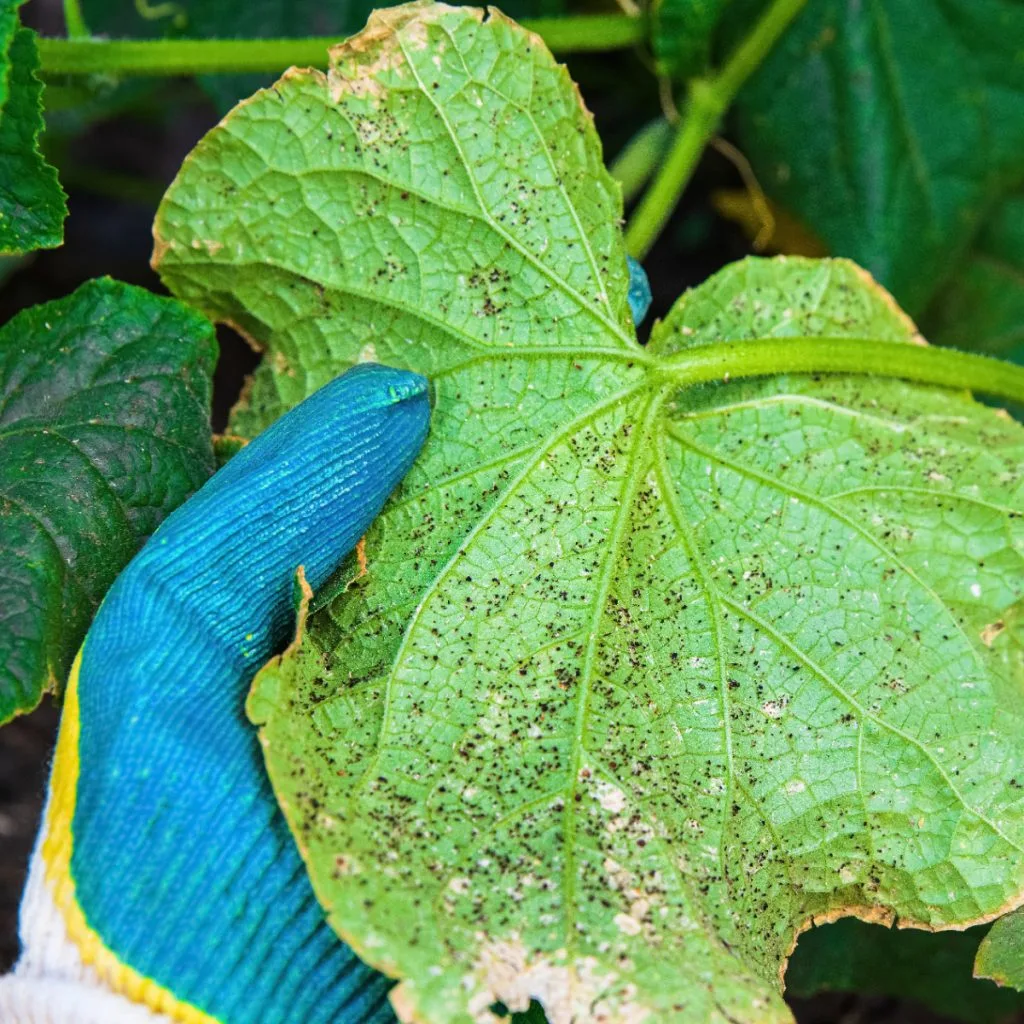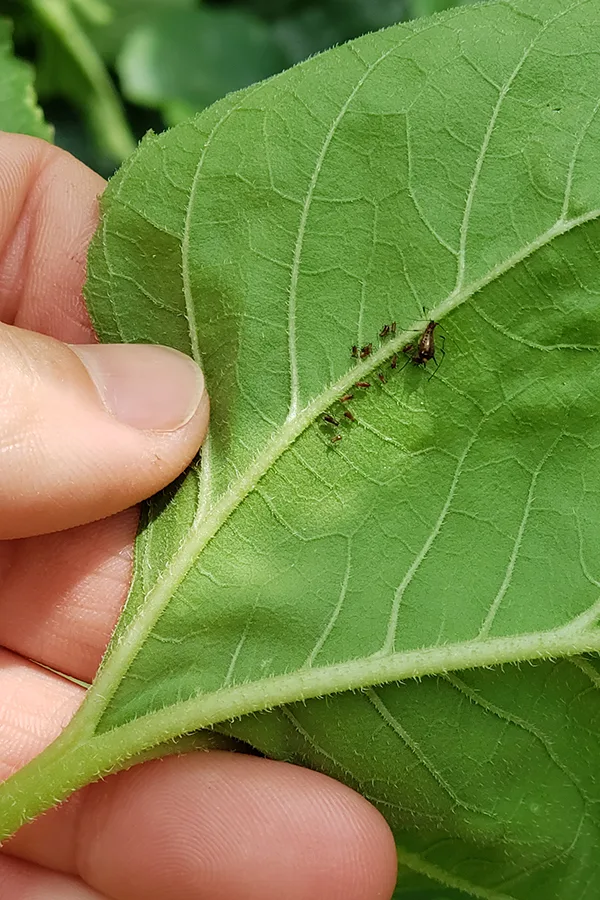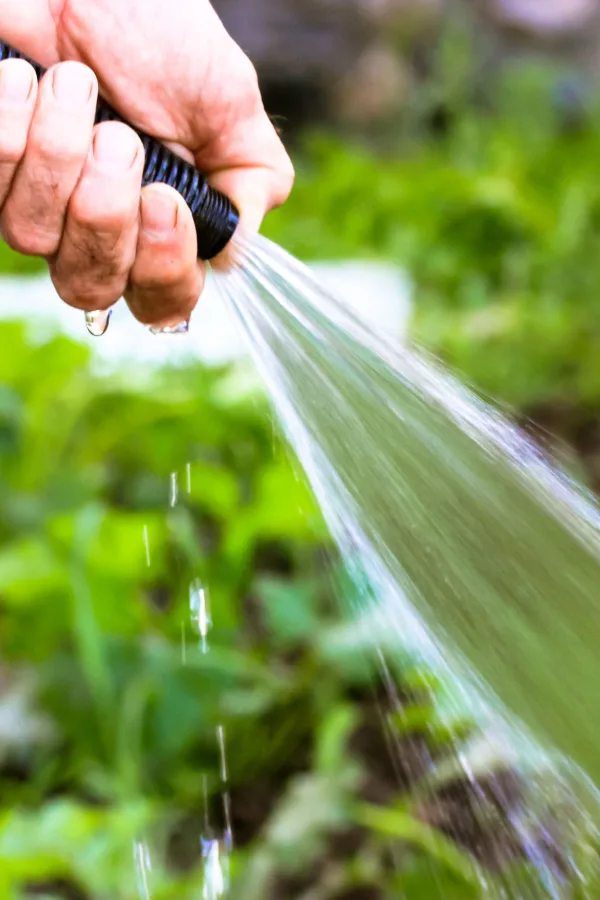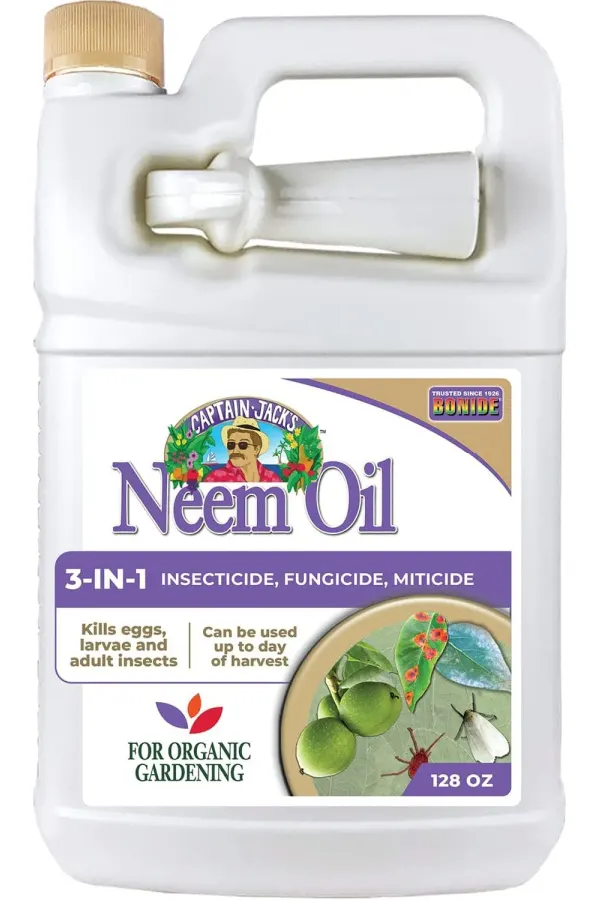Looking for a few all-natural, effective methods to stop aphids from damaging the plants in your vegetable garden?
Aphids can be a nightmare in the garden. One thing is for sure, the tiny, quick-multiplying insects can be hard to stop once they gain a foothold. And once they do, they can quickly bring harm to a wide array of vegetable plants – from tomatoes and peppers, to cucumbers, zucchini and more.
Aphids are soft-bodied insects that feed on the nutrient-rich sap that plants produce. While they prefer tender new growth, they will devour any type of stems, foliage, blooms, and even fruit. Especially when they begin to congregate in large numbers.

Finding A Way To Stop Aphids Fast!
A Little About Aphids…
Aphids can be hard to find with the naked eye. Young aphids (referred to as nymphs), can almost be invisible. Even adults are tiny as well, rarely growing to more than a quarter inch in size.
Aphid populations can explode rapidly. How fast? They are so productive that they can often triple the size of their colony in as little as just three days! Unfortunately, once a single plant in a garden setting is infected, the aphids can spread quickly to other plants too. Especially since they love to feed on such a wide variety of plants.
Not only do aphids damage and weaken plants by sucking the sap, they also carry a wide variety of viruses and diseases. Some injure plants significantly and lower yields, while others can overwhelm and kill vegetable plants altogether.
Although there are commercial insecticides that can control aphids, they can be quite unsafe for using in a vegetable garden where the harvest will be consumed. In addition, many insecticides also kill off beneficial insects and pollinators too, which can lead to other pest and productivity issues in the garden as well.
But there is good news! There are actually quite a few natural, safe and effective ways to stop aphids. And not only are they wonderful for controlling aphid populations – they also happen to be far less expensive and far less scary to use on plants!

Early Detection Is The Key
First and foremost, the most important key to keeping aphids under control is early detection. That is why taking a walk through your garden every few days is critical. The faster you spot them, the easier it will be to gain control of the population.
As mentioned earlier, aphids are very small and hard to see with the naked eye. Add to that fact that they typically live and lay their eggs on the underside of a plant’s foliage, and you have one sneaky pest that is easy to miss.
As you walk through your plants, turn the undersides of leaves over. Look for any signs of yellowing or curling of the leaves. Check new growth and blooms closely to look for signs of early damage since this is where aphids like to go first.
Also, look for an increase in ant activity on your plants. Ants are attracted to the honeydew that the aphids produce after they consume the plant’s sap. If you start to see more and more ants moving around your plants, you might have an aphid infestation starting. And the first line of defense is using good old water to get them off your plants!
Using Water To Stop Aphids
Since aphids and their eggs are small and fragile, it doesn’t take much to knock them both down. Once they are down on the ground, there is no nearby food source for them to eat. Because of that, they quickly die in the soil, unable to eat or reproduce.

To spray the aphids, use a garden hose or small sprayer with a more direct water stream. Be sure to spray both the bottom of the leaves as well as the top. Also, work from the top of the plant down to the ground to make sure you aren’t just knocking them off onto lower leaves.
As you spray, be sure not to hit the leaves or any new blooms with too much force from the water. A good direct flow of water will dislodge the aphids from the foliage, but too strong of a spray can injure leaves and blooms.
Neem Oil – The All Natural Fix To Stop Aphids
Neem oil is a great way to safely control an aphid infestation in short order. The oil is created by pressing oil from the seeds of neem trees. It is 100% organic, all natural, and, most importantly, safe for pollinators like butterflies and bees once it dries. Affiliate Link: Bonide Captain Jack’s Neem Oil, 128 oz Ready-to-Use.
Neem oil is good for not only helping to keep aphids under control, but many other garden pests as well. It also works well for controlling cucumber beetles, leaf miners, cabbage worms, ants and more. See our article: How To Get Rid Of Ticks With Neem Oil – Keep Your Yard Safe From Ticks!
To use neem oil, mix two teaspoons of pure neem oil with one gallon of water and a few drops of Dawn dish soap. Use a handheld sprayer to apply the mixture to the tops and undersides of the plant’s foliage. Repeat the process every couple of days and after any rain.
It is best to spray early in the morning or late in the evening with neem oil. This is when bees, butterflies and other pollinators are not active and allows the oil to dry. If wet, it can still harm these beneficial insects.
Companion Planting
Last but not least, when it comes to natural ways to stop aphids – there is companion planting. Companion planting is actually a great way to stop an invasion of aphids before they ever start.
Although there are many plants that aphids enjoy taking up residence on, there are also some that they detest – and by planting these in the garden, you can keep aphids from ever visiting.
In terms of deterring aphids, one of the best plants to grow nearby is marigolds. These plants are easy to grow from seed and produce multiple, fiery-colored blooms.
Marigolds put off a strong, offensive scent that is perfect for repelling aphids, tomato hornworms, whiteflies, mosquitoes, and more. Just having a few marigold plants growing around susceptible plants can be enough to deter aphids from staying and laying eggs.
Here is to stopping aphids in your vegetable garden this year – and to keeping your plants safe and productive! For more information on protecting your garden from pests, see our article: How To Keep Raccoons Out Of Your Garden – For Good!
Simple Garden Life
Follow Our Facebook Page For Even More Great Tips! Simple Garden Life Facebook Page
Simple Garden Life is a website dedicated to keeping gardening fun, simple and enjoyable! We publish two new articles each week along with a new garden podcast episode every two weeks. This article may contain affiliate links.

